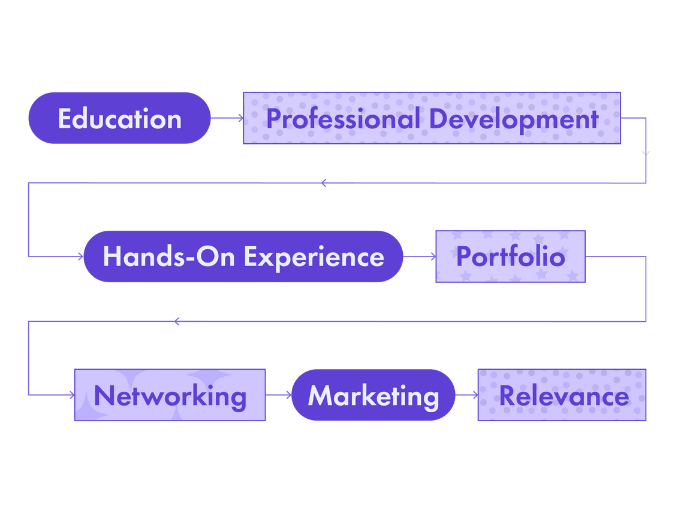7 Steps to Becoming a Freelance UX Researcher

As long as consumer-facing technology continues to innovate, there will be a need for UX (User Experience) researchers—professionals who study customers to optimize product or service offerings.
Make a Free Invoice NowWhile companies often hire in-house or contract with third-party research organizations, demand for freelance UX Researchers is rising. Freelance engagements connect low-overhead industry specialists with companies that need their services, creating a win for all parties.
What is a UX Researcher?
A freelance UX researcher performs in-depth consumer studies to glean actionable insights for their client. This process dramatically benefits tech companies creating software and digital products for the general public.
The core deliverable a UX researcher produces is called a product usability profile. Researchers create this profile by collecting and compiling data from real-world customers and study participants. The researcher seeks to understand how the customer interacts with the brand or product on a functional level. By diving deep into the customer’s experience, researchers gather evidence as to whether or not the product addresses the customer’s pain point as intended.
UX study results help businesses decide if their product is on the right track. Sometimes, this can lead to scrapping ideas and products altogether, but new pathways can arise from the research process, leading the business to tremendous success.
Types of UX Research

UX research can take many different forms. When assessing customers and creating product profiles, UX researchers use multiple research collection strategies across metrics depending on what best suits the client’s needs.
- Qualitative Research
- Quantitative Research
- Attitudinal Research
- Generative Research
- Evaluation-Based Research
Qualitative Research
Qualitative research observes small groups or individuals interacting with the product or service. It aims to explore why a user experiences a product the way they do.
Data collection methodology for qualitative UX studies may include the following:
- Focus groups
- Diaries
- Card sorting
- Interviews
This process illuminates why a user needs the product and how to use it, helping to shape the direction of product development.
Quantitative Research
Quantitative research relies on large data sets to analyze user feedback. This method aims to uncover patterns and trends in product experience to inform product developers about possible design flaws, glitches, misuse, and misunderstandings, as well as the percentage of people who found the product valuable and operational.
Researchers conduct quantitative research through remote usability testing in which users record themselves interacting with the product, surveys that collect feedback across multiple lines of inquiry, and other mass data collection methods.
Attitudinal Research
Attitudinal research provides meaningful information about user beliefs, perceptions, and expectations. This data, collected through self-reported studies, is used to assess the product intentionally and personally.
Participants in attitudinal studies often use a diary to document and report their experience with a product over a long period.
Generative Research
Generative research provides insight into a study participant’s life by emphasizing the user’s profile instead of the product. Generative research explores questions such as:
- Who is the user?
- How do they think?
- Where do they work?
- What was their childhood like?
These studies help show developers using their products how they can alter them to suit the needs of particular demographics better.
Evaluation-Based Research
Evaluation-based research seeks to answer a fundamental question: does the product work?
By providing participants with a sample of the product or service, researchers can evaluate whether or not the offering operates as intended. Product developers will use this information to make relevant changes to the product if needed.
UX Research Tools

The most successful UX researchers possess a set of “soft skills” that help them serve as a valuable bridge between client and consumer. If you have strong interpersonal skills and thrive in the face of creative challenges that require thinking outside the box, it may be a good sign that pursuing freelance UX research is suitable for you.
- Communication: The ability to communicate effectively with other members of the research process and study participants is crucial to a compelling study.
- Collaboration: Researchers must be able to work seamlessly with other specialists and stakeholders to collaborate in the data collection process.
- Empathy: When addressing the user’s experience and needs, compassion is necessary to address a potential issue surrounding the product and develop a viable solution.
- Critical Thinking: Researchers need strong critical thinking skills to ask the right questions and construct data meaningfully.
- Design Thinking: Understanding the design process expands the opportunities for researchers to assess the markers of product effectiveness and how to improve them.
Of course, tangible tools, like programs and software, are equally crucial to the role of a UX researcher. But qualities like the ones mentioned above set a great UX researcher apart from the rest.
How to Become a Freelance UX Researcher (7 steps)

Now that you know what a UX researcher does and how they do it, understanding the steps required to become a Freelance UX Researcher can help guide you toward a successful career in this industry.
Here’s a step-by-step guide to getting started as a freelance UX researcher.
- Take Education Seriously: Unfortunately, it’s challenging to break into a career as a UX researcher with any formal education. Most UX researchers possess a minimum of a graduate degree. Degree paths are primarily geared toward tech and behavioral science so that researchers know how to collect, input, and evaluate metrics.
- Professional Development: A formal education is only sometimes enough. Constantly educating yourself by doing research, taking in-class or self-led courses, and reading studies will be immensely helpful in preparing you for a career in UX research.
- Gain Experience: To be taken seriously as a UX researcher, especially as an individual operating freelance, you’ll need some practical experience. But how can you get your foot in the door? Volunteering at a UX research company, pursuing an internship, or creating sample studies for your freelance prospects are solid ways to show you can walk the talk.
- Develop Your Portfolio: Your portfolio can include relevant projects and studies you completed while working towards your degree and any work product from internships or volunteer roles.
- Network, Network, Network: The relationships you build and the friends you make along the way will lead you to valuable new opportunities you may not have even conceived of on your own
- Market Your Business: There are countless platforms where you can advertise your services and highlight your talents. Make sure you have an up-to-date LinkedIn profile and establish yourself on popular freelance websites to gain short and long-term leads.
- Stay Relevant: Keeping up with the trends, constantly updating your profiles, and showcasing your work on your website and social media accounts will create more opportunities to connect with clients and offer them up-to-date understandings of the modern customer.
As a freelancer, you are running your own one-person business. Remember that your goal is to sell yourself to potential clients as a knowledgeable professional who can make their life easier while improving their business’s bottom line.
How Much Does a Freelance UX Researcher Make?
A career as a freelance UX researcher can be both enjoyable and profitable for those who choose to pursue it. While average rates vary drastically based on experience and other factors, UX researchers generally enjoy a comfortable income and can charge upwards of $200 per hour on the higher end.
Is Freelance UX Research Right for You?
As a freelancer, you get to cut out the middleman of a third-party agency or employer. This ability allows you to take control of your rates, set your earning expectations, choose the clients you want to work with, and build a lucrative career.
If you have the proper skill set, a passion for the work, and a drive to succeed, you’ll likely find the rewards of operating a freelance UX research business outweigh the associated challenges and risks.


